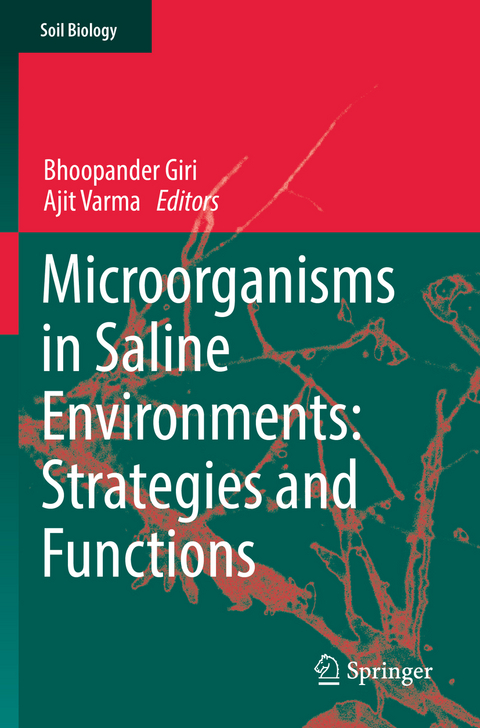
Microorganisms in Saline Environments: Strategies and Functions
Springer International Publishing (Verlag)
978-3-030-18977-8 (ISBN)
This book gathers the latest findings on the microbial ecology of saline habitats, plant-microbe interactions under saline conditions, and saline soil reclamation for agricultural use. The content is divided into four main parts: Part I outlines the definition of salinity, its genesis and impacts, and microbial diversity in saline habitats. Part II deals with impact of salinity on microbial and plant life/health. Part III highlights plant - microbe interactions in saline environments, and Part IV describes strategies for mitigation and reclamation of saline soils.
The salinization of arable land is steadily increasing in many parts of the world. An excessive concentration of soluble salts (salinity) in soils or irrigation water adversely affects plant growth and survival. This problem is exacerbated in arid and semiarid areas due to their low precipitation and high evaporation rates. In turn, poor management practices and policies for using river water forthe irrigation of agriculture crops often lead to the secondary salinization of soils.
.
Dr. Bhoopander Giri: Received his Ph.D in Mycorrhizal Research from the Department of Botany, University of Delhi in 2001. Dr. Giri has worked as a post-doctoral fellow at the Department of Plant Pathology, North Carolina State University, USA and is currently working as an Assistant Professor at the Department of Botany, Swami Shraddhanand College, University of Delhi, Delhi. He is a recipient of CSIR Research Associateship (2003), DST Young Scientist Fellowship (2005) and Raman Post-Doctoral Fellowship. He has served as a General Secretary (from 2013-2015) for International Symbiosis Society (ISS), USA. Dr. Giri is a life-member/member of many prestigious academic societies. Besides, he serves as a reviewer for several international and national journals, including Experimental and Environmental Botany, Planta, Applied Soil Ecology, Journal of Plant Growth Regulation, Agroforestry System, Colloids and Surfaces B: Biointerfaces, Scientia Horticulture, Acta Physiologia Plantarum, Spanish Journal of Agricultural Research, Journal of Experimental Botany, Institute for Life Long Learning (ILLL), University of Delhi (e-content) and UGC-CEC (pre-view subject expert). Dr. Giri has published more than 38 papers in the national and international peer-reviewed journals and books. His paper "Arbuscular mycorrhizal fungi in alleviation of salt stress" published in Annals of Botany Oxford Press, UK has been listed among TOP 10 cited publications (from 2009-2014) in the area of Biological Science and Agriculture by International Comparative Performance of India's Research Base, Department of Science and Technology Report 2015, India. He has presented research papers in several national and international conferences (Switzerland, Canada and USA etc.) and also served as organizing secretary. Dr. Giri has edited a book "Root Biology" published by Springer International Publishing AG-A Part of Nature 2018. Prof. Dr. Ajit Varma: Professor Varma has completed his PhD at the age of 25 years from Allahabad University and Former Professor, School of Life Sciences, Jawaharlal Nehru University, India. Presently, he is the Distinguished Scientist & Professor of Eminence of Amity Institute of Microbial Technology; Group Dy. Vice Chancellor, Ritnand Balved Education Foundation, and Vice Chairman, Amity Science, Technology & Innovation Foundation Amity University Uttar Pradesh, India. He has published more than 314 papers in reputed journals and has been serving as an editor-in-Chief of Soil Biology Series, Springer Verlag Germany. Dr Varma is the Fellow of Alexander-von-Humboldt Society, Germany, elected Fellow of National Academy Agricultural Sciences and Fellow of Microbiology Society of India.
Part 1. Genesis and Impact of Salinity on the Diversity and Distribution of Microorganisms in Saline Habitats.- 1. Salinity: An Overview.- 2. Occurrence and Distribution of Fungi in Saline Environments.- 3. Microbial Ecology of Saline Ecosystems.- 4. Microbial diversity of saline habitats: An overview of biotechnological applications.- 5. Investigation of the Structural and Functional Microbial Diversity in Indian Mangroves.- Part 2. Impact of Salinity on Plants and Microbial Life.- 6. Exopolysaccharides and Biofilms in Mitigating Salinity Stress: The Biotechnological Potential of Halophilic and Soil Inhabiting PGPR Microorganisms.- 7. Impact of Salinity Stress on Growth and Development of Aquatic Fungi.- 8. Cellular mechanisms of plant salt tolerance.- 9. Microorganisms Aiding Existence and Efficiency of Plants in Saline Environment: What We Know and What to Expect.- 10. Effect of Salinity on Physiological Processes in Plants.- Part 3. Plant-Microbe Interactions in Saline Environment.- 11. Influence of Native Arbuscular Mycorrhizal Fungi and Pseudomonas Fluorescens on Tamarix Shrubs Under Different Salinity Levels.- 12. Salt-tolerant Microbes: Isolation and Adaptation.- 13. The Mechanisms Involved in Enhancing Plant Salt Stress Tolerance Using Arbuscular Mycorrhizal Fungi.- 14. Plant Growth Promoting Bacteria for Improving Crops Under Saline Conditions.- 15. Insights in The Physiological, Biochemical and Molecular Basis of Salt Stress Tolerance in Plants.- 16. Arbuscular mycorrhizal fungi alleviate soil salinity stress in arid and semi-arid areas.- 17. Salinity Stress Dependent Coordination of Metabolic Networks in Relation to Salt Tolerance in Plants.- 18. Salt Stress on Plant Growth and Role of Microbes in Promoting Plant Growth Under Salt Stress.- Part 4. Strategies for Mitigation and Reclamation of Saline Soils.- 19. Strategies for Reclamation of Saline Soils.- 20. Biochar for Reclamation of Saline Soils
| Erscheinungsdatum | 05.03.2022 |
|---|---|
| Reihe/Serie | Soil Biology |
| Zusatzinfo | XVI, 466 p. 39 illus., 29 illus. in color. |
| Verlagsort | Cham |
| Sprache | englisch |
| Maße | 155 x 235 mm |
| Gewicht | 735 g |
| Themenwelt | Naturwissenschaften ► Biologie ► Botanik |
| Naturwissenschaften ► Biologie ► Mikrobiologie / Immunologie | |
| Naturwissenschaften ► Biologie ► Ökologie / Naturschutz | |
| Schlagworte | biodegradation • bioremediation • Environmental Pollution • Heavy metals • Paddy Soil • POPs • risk assessment • saline conditions • saline environments • saline soils • Salinity stress • salt stress • Salt tolerance • Soil Environment • Soil salinity |
| ISBN-10 | 3-030-18977-5 / 3030189775 |
| ISBN-13 | 978-3-030-18977-8 / 9783030189778 |
| Zustand | Neuware |
| Haben Sie eine Frage zum Produkt? |
aus dem Bereich


